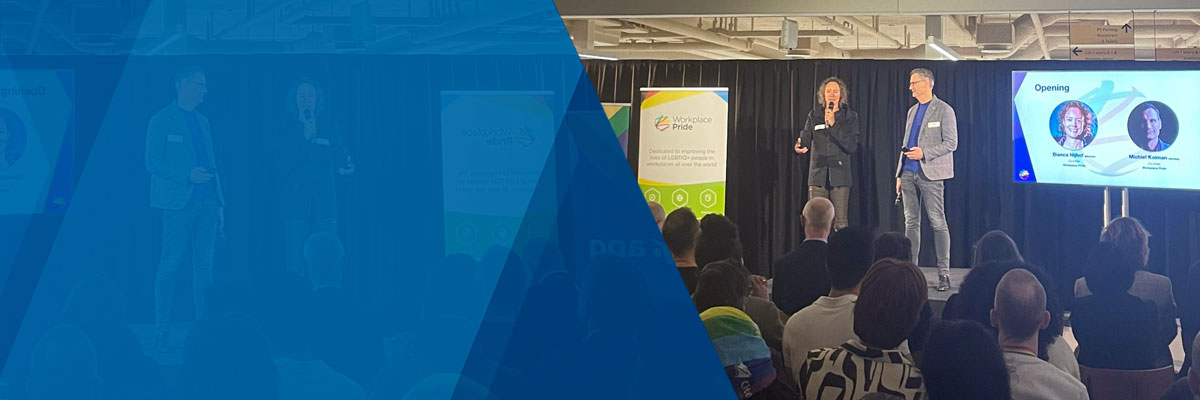As 2022 Pride week in Amsterdam continues, it is important to stop and take stock of the ongoing controversy surrounding ‘Pink Washing’ and the impact this has on both business and the LGBT community. The following article, which does just that, was published in the main financial newspaper in the Netherlands, the ‘Financial Dagblad’. Authors, Boris Dittrich and Michiel Kolman are a Workplace Pride Advisory Board Member and Co-Chair respectively.
For the Dutch translation scroll down.
Not every Pride sponsor engages in ‘pinkwashing’
Boris Dittrich, Michiel Kolman 2 Aug 16:30 Financieel Dagblad
A critical look at companies that deal opportunistically with Pride is urgently needed. But the pendulum is now swinging too much in the direction of sidelining companies. The queer community does not benefit from this, write Boris Dittrich and Michiel Kolman in their opinion piece.
In recent years criticism of Pride sponsors has become a regular feature of Pride Month. Not surprising, because everyone knows the examples of commercial parties that once a year beat the drum about the inclusion of LGBT people, but meanwhile do little to support the community throughout the year. Last year the Amsterdam convention center RAI proudly announced that it would be raising the rainbow flag, but the RAI wanted to see no less than 5000 euros when the organizers of the Pride Walk wanted to start in its parking lot. ‘Talk about pinkwashing,’ the justifiably angry Pride organization responded.
Partly because of incidents like this, criticism seems to have increased in the last couple of years. Some commentators wonder aloud whether the queer community should get involved with companies like PWC and Deloitte; while they might create a good impression with their sponsorships they serve in fact commercial interests and are also thought to support tax avoidance. A critical look at parties who deal opportunistically with the Pride is badly needed, but the pendulum is now swinging too much in the direction of completely sidelining the business community. This does not benefit the queer community.
We must remember that the vast majority of Pride sponsors take their role in inclusion very seriously. Recent research showed that 80 percent of the sponsors have active policies on LGBT inclusion in place. For instance, transition leave for transgender people is part of the HR policies, but also smaller but no less important steps such as the introduction of All Gender toilets or guidelines for inclusive language in the workplace. Supporting the Pride groups within the organization with time and budget is also an important pillar of a successful inclusion policy.
These inclusive policies are definitely necessary, as research (by the SCP) has shown that as many as 36 percent of LGBT people in the Netherlands experience discrimination in the workplace, from discriminatory jokes to sexual harassment. This shocking figure has enormous consequences: of the LGBT people who experience discrimination, 7 percent look for another job or stop working altogether. Recent research has also shown that a quarter of the LGBT staff who are out of the closet at work sometimes still choose to conceal their sexual orientation, for example in conversations about their private lives. Moreover, 26 percent of LGBT people view coming out at work as a disadvantage, e.g. for career opportunities. And 55+ LGBT people are twice as likely to be disabled than heterosexuals, have more burnouts, and are less satisfied with their work.
There is a major social problem here, and employers who take their role in this seriously are having significant impact on a large group of LGBT people. The aforementioned and maligned companies PWC and Deloitte are precisely examples of how to successfully work on inclusion. They score very well on the various aspects, such as support for Pride groups, internal monitoring of LGBT inclusion – for example with surveys – and implementing concrete policies for LGBT people, such as including regulations in the collective bargaining agreement.
In the Global Benchmark of the Workplace Pride Foundation, in which organizations are measured annually on the state of LGBT inclusion in their workplace, PWC and Deloitte have excellent scores. We also know from research that visibility and public support is an important component of how inclusion is experienced.
Anyone who wants to exclude these types of companies from Pride is throwing the baby out with the bathwater and in doing so harms not only LGBT people but also the innovative power of Amsterdam. The recent Open for Business report shows that LGBT-inclusive cities do better in terms of economic innovation and employment. Amsterdam tops the list for the second time in a row, and businesses play an important role in creating this inclusive and innovative climate.
Commercial parties that play a serious, positive role should be further encouraged to do so. Of course this involves much more than the annual hoisting of the rainbow flag or a boat in the canal pride. A structural approach to LGBT inclusion is needed throughout the year.
But what does such an approach look like? As is always the case with complex problems, there is no quick fix. Structural attention to employee identities is needed. This starts with recognizing and identifying the additional challenges for LGBT people within the organization. This sounds abstract, but fortunately, there are practical tools for companies who want to get started. Workplace Pride’s Global Benchmark and HRC’s Corporate Equality Index are examples of how to measure an organization’s performance in the area of LGBT workplace inclusion. Such benchmarks, which also address pain points for the organization, are an important first step in establishing an LGBT inclusion policy throughout the organization.
We must strive to broaden rather than narrow the struggle for inclusion, equal rights, and non-discrimination. That means we need allies and not just from the LGBT community itself. Let’s keep our eyes on the ball – together we are stronger.
Boris Dittrich, member advisory board Workplace Pride Foundation
Michiel Kolman, co-chairman of Workplace Pride foundation and senior VP at Elsevier
https://fd.nl/opinie/1447252/niet-elke-pride-sponsor-doet-aan-pinkwashing-qbh2ca84xRxB
—————————————————————————————————-
OPINIE
Niet elke Pride-sponsor doet aan ‘pinkwashing’
Boris Dittrich Michiel Kolman 16:30
Kritisch kijken naar bedrijven die opportunistisch omgaan met de Pride is hard nodig. Maar de pendule zwaait nu teveel de kant op naar het in de hoek zetten van het bedrijfsleven. De queergemeenschap is daar niet bij gebaat, schrijven Boris Dittrich en Michiel Kolman in hun opiniebijdrage.
Illustratie: Hein de Kort voor Het Financieele Dagblad
De afgelopen jaren is kritiek op sponsoren een vast onderdeel geworden van de Pride-maand. Niet verwonderlijk, want iedereen kent de voorbeelden van commerciële partijen die één keer per jaar op de trom slaan over inclusie van lhbti’ers, maar ondertussen weinig concreets doen om te gemeenschap te steunen. Zo liet de RAI vorig jaar trots weten de regenboogvlag te hijsen, maar wilde het congrescentrum maar liefst €5000 zien toen de organisatie van Pride Walk die demonstratie door Amsterdam vanaf het parkeerterrein van de RAI van start wilde laten gaan. ‘Talk about pinkwashing!’, reageerde de (terecht boze) organisatie.
Mede door dit soort gebeurtenissen zwelt de kritiek verder aan. Sommige commentatoren vragen zich hardop af of de queergemeenschap zich wel met bedrijven als PwC en Deloitte moet inlaten, omdat zij mooie sier maken met sponsoring, maar ondertussen commerciële belangen dienen en betrokken zouden zijn bij belastingontwijking. Kritisch kijken naar partijen die opportunistisch omgaan met de Pride is hard nodig, maar de pendule zwaait nu teveel de kant op van het in de hoek zetten van het bedrijfsleven. De queergemeenschap is daar niet bij gebaat.
We moeten niet vergeten dat verreweg de meeste Pride-sponsoren hun rol bij het inclusievraagstuk zeer serieus nemen. Dit jaar blijkt uit onderzoek dat 80% van hen actief beleid voert voor lhbti-inclusie. Daarbij kan worden gedacht aan het opnemen van transitieverlof voor transgender personen in de cao. Maar ook aan op het oog kleinere, maar niet minder belangrijke stappen als het invoeren van genderneutrale toiletten, of richtlijnen voor inclusief taalgebruik op de werkvloer. Ook het met tijd en budget ondersteunen van de Pridegroepen binnen de organisatie is een belangrijke pijler van succesvol inclusiebeleid.
Beleid is keihard nodig
Dat soort beleid is keihard nodig. Uit onderzoek van het Sociaal en Cultureel Planbureau (SCP) blijkt dat maar liefst 36% van de lhbti’ers in Nederland discriminatie op de werkvloer ervaart. Dit varieert van discriminerende grappen tot seksuele intimidatie. Dit schrikbarende cijfer heeft enorme consequenties: van de lhbti’ers die discriminatie ervaren, zoekt 7% een andere baan of stopt helemaal met werken. Uit recent onderzoek blijkt bovendien dat een kwart van de lhbti’ers die op het werk ‘uit de kast’ is, er op sommige momenten tóch voor kiest de seksuele oriëntatie te verhullen, bijvoorbeeld in gesprekken over het privéleven. In Nederland ziet 26% van de lhbti’ers een coming-out op het werk als een nadeel, onder meer voor de carrièrekansen. En 55+ lhbtiers worden twee keer zo vaak arbeidsongeschikt als hetero’s, hebben meer burnouts en zijn minder tevreden met hun werk.
Er is hier, kortom, sprake van een groot maatschappelijk probleem. Werkgevers die hun rol hierin serieus nemen, maken serieuze positieve impact op een grote groep lhbti’ers. De eerdergenoemde en vermaledijde bedrijven PwC en Deloitte zijn juist voorbeelden van hoe je succesvol aan inclusie werkt. Zij scoren zeer goed op de diverse aspecten, zoals steun voor Pridegroepen, het intern monitoren van de lhbti-inclusie (bijvoorbeeld met enquêtes) en het voeren van concreet beleid voor lhbti’ers, zoals het opnemen van regelingen in de cao.
In de Global Benchmark van stichting Workplace Pride, waarin organisaties jaarlijks doormeten hoe het staat met de lhbti-inclusie op hun werkvloer, scoren deze twee bedrijven uitstekend. Uit onderzoek weten we bovendien dat zichtbaarheid en publieke steun een belangrijk ingrediënt is voor het gevoel van inclusie.
Wie dit soort bedrijven van de Pride wil weren, gooit het kind met het badwater weg. Je schaadt daarmee niet alleen lhbti’ers, maar ook de innovatieve kracht van Amsterdam. Het recente rapport Open for Business toont aan dat lhbti-inclusieve steden het beter doen in economische vernieuwing en werkgelegenheid. Amsterdam prijkt voor het tweede keer op rij bovenaan de lijst, en bedrijven spelen een belangrijke rol in het creëren van dit inclusieve en innovatieve klimaat.
‘Wie dit soort bedrijven van de Pride wil weren, gooit het kind met het badwater weg’
Commerciële partijen die een serieuze, positieve rol spelen moeten daartoe verder worden aangemoedigd. Als vanzelfsprekend komt daar veel meer bij kijken dan het jaarlijkse hijsen van de regenboogvlag of een boot over de grachten varen. Er is het hele jaar een structurele aanpak nodig voor lhbti-inclusie.
Geen quick fix
Maar hoe ziet zo’n aanpak er dan uit? Zoals altijd het geval met complexe vraagstukken, bestaat er geen quick fix. Er is structureel aandacht voor de identiteiten van medewerkers nodig. Dat begint bij het erkennen en in kaart brengen van de extra uitdagingen voor lhbti’ers binnen de organisatie. Klinkt dit u wat abstract? Gelukkig zijn er praktische handvatten voor bedrijven die hiermee aan de slag willen. De Global Benchmark van Workplace Pride en de Corporate Equality Index van HRC zijn voorbeelden van hoe je elk jaar kunt meten hoe goed of slecht je organisatie het doet in lhbti-inclusie op de werkvloer. Meten is weten. Met metingen, waarin ook de pijnpunten voor de organisatie aan bod komen, zet je als bedrijf een belangrijke eerste stap voor een lhbti-inclusiebeleid.
We moeten ernaar streven de strijd voor inclusie, gelijke rechten en non-discriminatie te verbreden, in plaats van te vernauwen. Dat betekent dat we bondgenoten nodig hebben, en niet alleen uit de lhbti-gemeenschap zelf. Laten we onze ogen op de bal houden – samen staan we sterk.
Michiel Kolman is co-voorzitter van stichting Workplace Pride, Boris Dittrich is lid van de adviesraad van deze stichting.



































